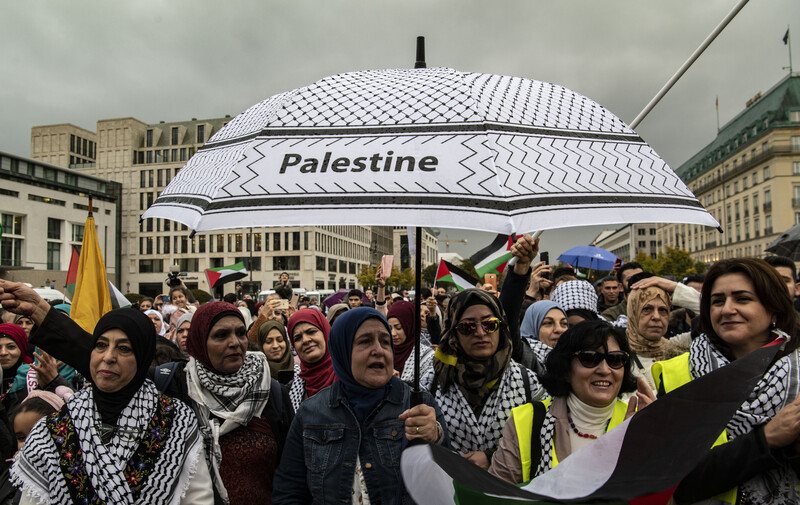Rights and Accountability 26 October 2020

Pro-Palestinian activism in Germany is under attack to the extent that even the word ‘Palestine’ is deemed problematic.
DPAThe German Konrad Adenauer foundation has cancelled the seminar, “Palestine” - History and Problems of a Concept, just a day after it was announced.
The cancellation comes after protests were raised over an invitation that suggested that the seminar would discuss the “anti-Semitic associations” of the term “Palestine.”
Among those who called for the cancellation of the event were the foundation’s own Ramallah branch as well as its sometime local partner organization, the Palestine Institute for Public Diplomacy (PIPD).
PIPD’s director Salem Barahmeh said his organization was “outraged and disturbed at an upcoming event conflating our existence and identity with anti-Semitism. This is dangerous, racist and erasure.”
In response, the Adenauer foundation claimed it had been a misunderstanding caused by an invitation that had been “worded in a misleading manner.”
Plenty of people begged to differ, however, suggesting there is little “misleading” about declaring “Palestine” a “problematic” term: rather that seems a straightforward attack on the identity of the Palestinian people.
Toxic climate
The furore comes at a time when discussion over Palestine takes place in a toxic climate in Germany.
After the German parliament adopted an anti-BDS resolution in May last year, attempts to suppress Israel critics and supporters of Palestinian rights have increased.
The parliamentary resolution is based on the widely criticized IHRA definition of anti-Semitism, which conflates criticism of Israel’s anti-Palestinian policies and Zionist state ideology with anti-Jewish bigotry.
The Konrad Adenauer invitation, for instance, referred to a criminal complaint filed by Frankfurt’s mayor, city treasurer and Hessian anti-Semitism commissioner, Uwe Becker, in which he derided pro-Palestinian protesters for shouting “From the river to the sea - Palestine will be free.”
Such language, he said, is “part of the vocabulary of anti-Semites and Israel-haters.”
And Becker is not the only anti-Semitism commissioner who seems to have a problem with Palestinians.
Berlin’s anti-Semitism chief Samuel Salzborn gets positively panicky when he hears the word Palestine.
“When you’re sitting in the train and the people next to you start talking about ‘Palestine’ without any apparent reason, it means it is time to either get off the train, put on your headphones, or scream at them,” Salzborn tweeted last October.
He followed up with the hashtag “anti-Semitism.”
The Konrad Adenauer Foundation claims to promote “freedom and liberty, peace and justice” in its civic education programs at home and abroad.
But branding the word Palestine as “problematic” – and with it, the Palestinian people – suggests the foundation has been unable to resist the choir of German anti-Palestinian voices prevalent today.
School for Unlearning Zionism
The Konrad Adenauer debacle took place at the same time as a group of Jewish students at the Weissensee Academy of Art Berlin caused a controversy of their own.
The group of Israelis – members of a large community of Israelis who have emigrated to Berlin to start a new life over the past decades – had organized a ”School for Unlearning Zionism,” to start this month.
The “school’s” October program features Israeli historian Ilan Pappe, sociologist Ran Greenstein, film director Mohammed Alatar, chair of Jewish Voice for Just Peace in the Middle East, Iris Hefets, and journalist and economic researcher Shir Hever.
The Israeli embassy in Berlin immediately accused the art school of “stoking anti-Semitism against the Jewish state.”
The embassy used the IHRA definition of antisemitism to accuse the art school of denying “the Jewish people’s right to self-determination.”
The Israeli embassy further claimed that the Unlearning Zionism project is organized by activists affiliated with the boycott, divestment and sanctions (BDS) movement.
The German anti-BDS resolution urges German institutions and public authorities to deny funding and facilities to civil society groups that support the BDS movement.
Sometimes merely the “suspicion of proximity to BDS” is enough to prohibit the use of urban spaces for an event, reported the German daily TAZ
That, according to loyal Israel supporter and former Green lawmaker Volker Beck, was the case with the “School for Unlearning Zionism” project.
Beck informed the ministry of education and research, and the art school withdrew the funding of the project and closed down the webpage.
But a week later the school revoked its decision and put the website back online.
Yossi Bartal, an Israeli left-wing activist who lives in Berlin denounced the intervention as a “group of white Germans” preventing a group of Jewish Israelis to “critically reflect on their own history.”“As if the power to define our own history were German property.”
Yehudit Yinhar, art student and co-organizer of the project, is determined to proceed with the program. The lectures can be watched online





Comments
Problematic?
Permalink tom hall replied on
Appointing regional "anti-Semitism commissioners" throughout Germany- that's "problematic". In fact, when considered in light of Germany's history of mass murder of Europe's Jews, any form of state regulation surrounding Jewish identity and legal protections is downright chilling. Berlin has become a place where Palestinians and Israeli Jews live in close proximity and with a sense of social ease that would be impossible in the land of their birth. Allowing Zionist surrogates to impose a form of cultural apartheid on those communities living in Germany simply updates a mechanism of racism present-day legislators would have us believe is a thing of the past.
As for the School for Unlearning Zionism, the decision by the art school to reinstate the project is very welcome news. Hopefully a methodology and curriculum can be developed at these sessions which can be usefully disseminated throughout Europe and beyond. May this initial step prove a fruitful one. Especially incisive was the statement quoted in the article here from Yossi Bartal, pointing out that the interference by Volker Beck and his associates represented an attempt by white Germans to decree for Jews the parameters of critical discussion.